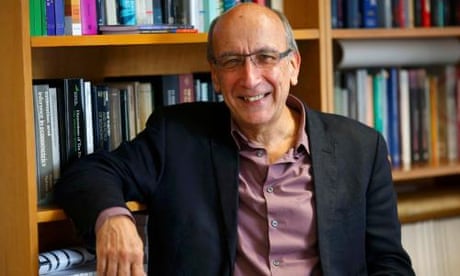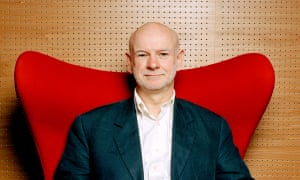The award glorifies economists as tellers of timeless truths, fostering hubris and leading to disaster
Joris Luyendijk in The Guardian

‘A Nobel prize in economics implies that the human world operates much like the physical world.’ Photograph: Jasper Rietman
Business as usual. That will be the implicit message when the Sveriges Riksbank announces this year’s winner of the “Prize in Economic Sciences in Memory of Alfred Nobel”, to give it its full title. Seven years ago this autumn, practically the entire mainstream economics profession was caught off guard by the global financial crash and the “worst panic since the 1930s” that followed. And yet on Monday the glorification of economics as a scientific field on a par with physics, chemistry and medicine will continue.
The problem is not so much that there is a Nobel prize in economics, but that there are no equivalent prizes in psychology, sociology, anthropology. Economics, this seems to say, is not a social science but an exact one, like physics or chemistry – a distinction that not only encourages hubris among economists but also changes the way we think about the economy.
A Nobel prize in economics implies that the human world operates much like the physical world: that it can be described and understood in neutral terms, and that it lends itself to modelling, like chemical reactions or the movement of the stars. It creates the impression that economists are not in the business of constructing inherently imperfect theories, but of discovering timeless truths.

Economist Sir Richard Blundell among Nobel prize frontrunners
To illustrate just how dangerous that kind of belief can be, one only need to consider the fate of Long-Term Capital Management, a hedge fund set up by, among others, the economists Myron Scholes and Robert Merton in 1994. With their work on derivatives, Scholes and Merton seemed to have hit on a formula that yielded a safe but lucrative trading strategy. In 1997 they were awarded the Nobel prize. A year later, Long-Term Capital Management lost $4.6bn (£3bn)in less than four months; a bailout was required to avert the threat to the global financial system. Markets, it seemed, didn’t always behave like scientific models.
In the decade that followed, the same over-confidence in the power and wisdom of financial models bred a disastrous culture of complacency, ending in the 2008 crash. Why should bankers ask themselves if a lucrative new complex financial product is safe when the models tell them it is? Why give regulators real power when models can do their work for them?
Many economists seem to have come to think of their field in scientific terms: a body of incrementally growing objective knowledge. Over the past decades mainstream economics in universities has become increasingly mathematical, focusing on complex statistical analyses and modelling to the detriment of the observation of reality.
Consider this throwaway line from the former top regulator and London School of Economics director Howard Davies in his 2010 book The Financial Crisis: Who Is to Blame?: “There is a lack of real-life research on trading floors themselves.” To which one might say: well, yes, so how about doing something about that? After all, Davies was at the time heading what is probably the most prestigious institution for economics research in Europe, located a stone’s throw away from the banks that blew up.

Howard Davies, pictured in 2006. Photograph: Eamonn McCabe for the Guardian
All those banks have “structured products approval committees”, where a team of banking staff sits down to decide whether their bank should adopt a particular new complex financial product. If economics were a social science like sociology or anthropology, practitioners would set about interviewing those committee members, scrutinising the meetings’ minutes and trying to observe as many meetings as possible. That is how the kind of fieldwork-based, “qualitative” social sciences, which economists like to discard as “soft” and unscientific, operate. It is true that this approach, too, comes with serious methodological caveats, such as verifiability, selection bias or observer bias. The difference is that other social sciences are open about these limitations, arguing that, while human knowledge about humans is fundamentally different from human knowledge about the natural world, those imperfect observations are extremely important to make.
Compare that humility to that of former central banker Alan Greenspan, one of the architects of the deregulation of finance, and a great believer in models. After the crash hit, Greenspan appeared before a congressional committee in the US to explain himself. “I made a mistake in presuming that the self-interests of organisations, specifically banks and others, were such that they were best capable of protecting their own shareholders and their equity in the firms,” said the man whom fellow economists used to celebrate as “the maestro”.

Nobel Prizes in science: strictly a man’s game?
In other words, Greenspan had been unable to imagine that bankers would run their own bank into the ground. Had the maestro read the tiny pile of books by financial anthropologists he may have found it easier to imagine such behaviour. Then he would have known that over past decades banks had adopted a “zero job security” hire-and-fire culture, breeding a “zero-loyalty” mentality that can be summarised as: “If you can be out of the door in five minutes, your horizon becomes five minutes.”
While this was apparently new to Greenspan it was not to anthropologist Karen Ho, who did years of fieldwork at a Wall Street bank. Her book Liquidated emphasises the pivotal role of zero job security at Wall Street (the same system governs the City of London). The financial sociologist Vincent Lépinay’s Codes of Finance, a book about the division in a French bank for complex financial products, describes in convincing detail how institutional memory suffers when people switch jobs frequently and at short notice.
Perhaps the most pernicious effect of the status of economics in public life has been the hegemony of technocratic thinking. Political questions about how to run society have come to be framed as technical issues, fatally diminishing politics as the arena where society debates means and ends. Take a crucial concept such as gross domestic product. As Ha-Joon Chang makes clear in 23 Things They Don’t Tell You About Capitalism, the choices about what not to include in GDP (household work, to name one) are highly ideological. The same applies to inflation, since there is nothing neutral about the decision not to give greater weight to the explosion in housing and stock market prices when calculating inflation.

Ha-Joon Chang, pictured at the Hay-on-Wye festival, Wales. Photograph: David Levenson/Getty Images
GDP, inflation and even growth figures are not objective temperature measurements of the economy, no matter how many economists, commentators and politicians like to pretend they are. Much of economics is politics disguised as technocracy – acknowledging this might help open up the space for political debate and change that has been so lacking in the past seven years.
Would it not be extremely useful to take economics down one peg by overhauling the prize to include all social sciences? The Nobel prize for economics is not even a “real” Nobel prize anyway, having only been set up by the Swedish central bank in 1969. In recent years, it may have been awarded to more non-conventional practitioners such as the psychologist Daniel Kahneman. However, Kahneman was still rewarded for his contribution to the science of economics, still putting that field centre stage.

Think of how frequently the Nobel prize for literature elevates little-known writers or poets to the global stage, or how the peace prize stirs up a vital global conversation: Naguib Mahfouz’s Nobel introduced Arab literature to a mass audience, while last year’s prize for Kailash Satyarthi and Malala Yousafzai put the right of all children to an education on the agenda. Nobel prizes in economics, meanwhile, go to “contributions to methods of analysing economic time series with time-varying volatility” (2003) or the “analysis of trade patterns and location of economic activity” (2008).
A revamped social science Nobel prize could play a similar role, feeding the global conversation with new discoveries and insights from across the social sciences, while always emphasising the need for humility in treating knowledge by humans about humans. One good candidate would be the sociologist Zygmunt Bauman, whose writing on the “liquid modernity” of post-utopian capitalism deserves the largest audience possible. Richard Sennett and his work on the “corrosion of character” among workers in today’s economies would be another. Will economists volunteer to share their prestigious prize out of their own acccord? Their own mainstream economic assumptions about human selfishness suggest they will not.
Giles Fraser in The Guardian
Theresa May won’t be around in the early 22nd century when, according to Star Trek at least, Dr Emory Erickson will have invented the transporter – a device that will be able to dematerialise a person into an energy pattern, beam them to another place or planet, and then rematerialise them back again. In such a world people will be able to move as quickly and freely as an email.
The philosopher Derek Parfit has rightly questioned whether such a thing is even philosophically possible: will the rematerialised person be the same person as the dematerialised one, or just a perfect copy. (What would happen if two copies of me were rematerialised? Would they both be me?) Parfit thus raises a fascinating philosophical question about what we mean by personal identity – or what makes me me.
But, just for the sake of argument, imagine what such a device would do to Mrs May’s keep-them-all-out immigration policy. With the transporter, there could be no border controls and no restrictions on the free movement of individuals. Economic migrants would love it. People will be able to live and work where they like, beaming instantly from Syria to Sussex or indeed to Saturn. And because of this, the whole concept of the nation state will eventually wither away. People will have become more powerful than the state.
Fanciful? Of course. Forget about the technical problems. The fundamental problem is that human beings are not fungible. A copy is not the same as its original. A person cannot be dematerialised into a series of digital zeros and ones, get beamed over space and be rematerialised as the same person.
But – and here is the really big thing – money can be. For the whole point about money is that it is fungible. It can be converted into zeros and ones and it can be digitally shot across space. And since the late 1970s, when capital controls were relaxed all around the world, and then even more so since the digital revolution, money has been able to go where it pleases, unimpeded, without any need for a passport or reference to border control. Every day, trillions of dollars are economic migrants, crossing boundaries as if they didn’t exist, pouring in and out of countries looking for the most economically advantageous place to be. And, just as with the fanciful people-transporter example, this free movement of capital is how the nation state is dissolving.
This week the OECD published a report on international companies and tax avoidance. Big companies like AstraZeneca are able to pay next to no tax in the UK because they just transport their profits to a low-tax regime in another country. Indeed, some countries, pathetically prostrating themselves before the gods of finance, exist for little other than this purpose. And so the situation we find ourselves in is that money is free to travel as it pleases but people are not. We have got used to this as the new normal, and it largely goes unremarked. Yes, there are a few on the libertarian fringe who recognise this as a contradiction and argue that people should be as free as capital. But the majority on the right do everything they can to protect the free movement of capital and restrict the free movement of people.
Which is why the neoliberal right in Britain has utterly contradictory instincts over Europe – they want the free trade bit but they don’t want the free people bit. And they scare us with how the free movement of people threatens our national identity but refuse to face the fact that the free movement of capital can be seen as doing exactly the same. They talk a good game about the importance of freedom: but it’s one rule for capital and another for people.
Of course the transporter won’t happen. But with the internet, the imagination can travel where it will. And that means poor people will always see and want what rich people have. And not even Mrs May will be able to stop them crossing dangerous seas and borders to find it.
Allister Heath in The Telegraph
There is not much that the French do better than us these days when it comes to economics. Housing is the glaring, humiliating exception: for the first time in a generation, France’s homeownership rate has overtaken Britain’s.
When I first stumbled upon this remarkable fact, I could almost not believe it. Isn’t Britain supposed to be weirdly obsessed with home ownership, unlike our happy-go-lucky continental neighbours who, we are endlessly told, are perfectly content to rent?
But the statistics are true: while we have been plunged into an intensifying housing crisis that has locked millions of young people out of the market and forced others to live in over-priced rabbit hutches, the French have been quietly building an ownership society that would have made Lady Thatcher proud. The desire to own the roof over one’s head, so powerfully described in the Prime Minister’s Conservative party speech yesterday, is a universal urge, shared even by voters in not so socialist France.
It is therefore shocking that just 63.3 per cent of English households now own their own home, down from 70.9 per cent in 2003 and back to levels last seen three decades ago. In stark contrast, home ownership has beenshooting up in France, rising from 60.5 per cent in 2007 to 64.3 per cent in 2013. British and US commentators who believe that home ownership is passe and that we must all join Generation Rent need to look beyond the English-speaking world.
The UK is now well below the European Union average: across the 28 member states, 70 per cent of households are owner-occupiers. This is an extraordinary reversal which goes to the heart of David Cameron’s vision for an aspirational meritocracy.
The Prime Minister’s speech was a powerful restatement of the small-c conservative case for an opportunity society, as opposed to the Left’s obsession with equality of outcomes: he wants anybody who works hard and behaves responsibly to get ahead in life, regardless of background or ethnicity. He wants renters to become owners, and employees to become employers, which is exactly what a Tory prime minister who cares about social mobility should be saying.
Yet he understands not just the extent to which modern Britain has become an aspirational, individualistic society (a reality that Jeremy Corbyn cannot grasp), but also that aspiration without hope is debilitating (a concept that the left is more at ease with). One of the most moving phrases in his speech yesterday was his description of “children with their noses pressed to the window as they watch the world moving ahead without them”.
Given the importance of home ownership to the British dream, the government must do much more to fix our homeownership crisis. This is not just the right thing to do; it is also a matter of life or death for the Conservative party itself. With Labour firmly captured by the hard Left, it is at least conceivable that a Tory party that bestrides the common ground could return to levels of support last seen in the 1980s, and win the next two general elections.
Three main obstacles lie in the way of this Tory dream: in the short-term, the party could be destroyed by the European question; in the medium-term, it could be derailed by the next economic crisis; but in the longer-term the ongoing housing crisis could kill off Britain’s ownership society, changing our national culture and shifting the electorate back into the arms of the Left.
Politics is complicated, of course, with many variables explaining how people vote; but it is clear that housing status is one of the central determinants. When YouGov surveyed 100,000 general election voters, it discovered that the Tories led Labour by 47-23 per cent among those who own their homes outright, and by 42-29 per cent among those with mortgages. But the parties were almost tied among private renters, with Labour enjoying a 25-point lead among social tenants. Another seven-point decline in the homeownership rate would cost the Tories dozens of seats; an increase could put Labour out of power for a generation.
It used to be argued that Britain’s changing demographics and Labour’s supposed stronghold on the ethnic minority vote meant that the Tories were doomed. This is nonsense: the Tories are starting to crack sections of this electorate, with one poll suggesting they may even have won a plurality of the Hindu and Sikh vote for the first time in May. Mr Cameron’s push for a colour-blind society in Manchester can only have helped build on this extraordinary achievement. The real ticking time bomb for the Tories is home ownership.
Britain’s housing crisis is one of under-supply: for the past two decades at least, far too few homes have been built. But while the problem is easy to identify, tackling it is fiendishly difficult given the vested interests involved. Redefining “affordable housing” as homes that can be owned, not just rented, is a small step in the right direction. The deal with housing associations to extend the right to buy will also help. But more is needed.
Remarkably, 354,700 new homes were built in France last year, compared with 140,880 across the UK, a pathetically inadequate number barely half of that required. The French were actually bitterly disappointed with their own performance: their recent average has been around 400,000 homes a year.
Mr Cameron is right, therefore, to be calling for a national crusade for house-building. State-owned brownfield sites must urgently be made available for development, though this will not be a panacea. A further liberalisation of the planning laws will also be required, and one final taboo tackled: we need to accept than not all Green Belt land is worth preserving.
We shouldn’t build on forests, of course, but swathes of what is classified as Green Belt isn’t even green: plenty of derelict land, quarries and ugly, unattractive sites are also wrongly protected. Some of this could be converted into parks and homes with gardens and the right infrastructure, benefiting hundreds of thousands of families. For their own sake, Tory councillors and MPs need to start embracing sensible, well-managed development: if not, the party will soon find out that it is either on the side of aspiring homeowners, or it is nothing.
Andrew Critchlow in The Telegraph
After hanging on for almost a year, the US shale oil industry is on the brink of complete capitulation. The reason for its impending downfall is simple: the lowest cost producer always wins. In this instance the most profitable producers are Saudi Arabia and its close Gulf Arab allies, who effectively control the Organisation of the Petroleum Exporting Countries (Opec).
To their credit, shale drillers and operators in Texas and North Dakota have hung on for far longer than anyone expected after Opec launched its pre-emptive oil price war last November. However, a year of oil prices trading at an average of around $50 per barrel is finally succeeding in reversing the dramatic increases in US production that had been so troubling the Gulf’s oil-rich sheikhs.
Total US output has fallen by almost 600,000 barrels per day (bpd) since the end of the first quarter, with the biggest declines occurring recently as operators begin to crack under the financial pressure caused by Opec’s squeeze on prices. By next year, the US government expects output to decline to an average of 8.6m bpd, down from an average of 9.3m bpd in 2015.
According to Mark Papa, the former head of US shale oil specialist operator EOG Resources, this is just the beginning of the downturn in North America. Speaking at the annual Oil and Money conference in London this week, Mr Papa said: “We are about to see a pretty dramatic decline in US production growth.”
The insurmountable problem the US shale oil industry faces is that it is too highly dependent on debt and too reliant on crude trading above $60 per barrel to remain profitable. Break-even prices in America’s most productive areas, such as the Eagle Ford and Bakken, are thought to range from $54 to almost $70 a barrel, which currently means producers are operating at a loss, living in hope that Opec finally relents and cuts production.

In these circumstances the only thing keeping many US drillers afloat is debt, which up until now has been cheap and plentiful.
According to the data provider Factset, the amount of debt held by US oil and gas producers has ballooned to almost $170bn (£111bn) this year, compared with $81bn five years ago. But the cost of servicing that debt has also increased exponentially after a number of operators saw their ratings reduced to junk.
Opec now only has to maintain its fragile cohesion and push a little harder for the entire shale oil industry in the US to fold.
However, the group of 12 mainly Middle Eastern oil producers is itself feeling the pain of lower oil prices. Its wealthiest members, such as Saudi Arabia, the United Arab Emirates and Kuwait, are having to fall back on their foreign currency reserves for the first time in almost 20 years to make up for the shortfall in revenues.
Poorer member countries such as Venezuela, Algeria and Nigeria are now at economic breaking point. Without vast sovereign wealth funds and an abundance of cheap oil, they are close to buckling and are demanding that Opec meets to revise its current strategy.
Although Opec’s secretary general has called for a meeting of oil experts in Vienna later this month, it is extremely unlikely that ministers from the group will gather before their next scheduled date in December. Meanwhile, Saudi Arabia has continued to pump at record rates above 10.5m bpd, a strategy which is making a mockery of Opec’s overall production ceiling of 30.5m bpd.
And then there is Iran and Iraq. Combined, these close political allies in the Middle East pose the biggest challenge to Saudi Arabia’s dominance of Opec. However, both countries desperately need higher oil prices to help shore up their battered economies.
Baghdad has compensated for falling oil prices by pumping more crude. The second largest producer in Opec is now pumping around 4m bpd of crude to replenish its dwindling foreign currency reserves, which have fallen by around 20pc this year.
Iran is also champing at the bit to increase production – with the end in sight for its economic isolation from the rest of the world. According to the Iranian government, the country could increase oil production by around 500,000 barrels per day within a few months of economic sanctions being fully lifted. The Islamic republic is already laying the foundations for a return of international oil companies, which could help to boost output.
Top oil official Seyed Mehdi Hosseini told a room packed with Western executives at the Oil and Money conference that Tehran was ready to offer 50 new projects to international investors. Any significant increase in Iranian oil supply would add to the current oversupply in markets, pushing prices even lower.






